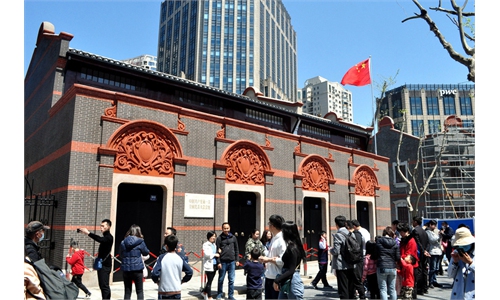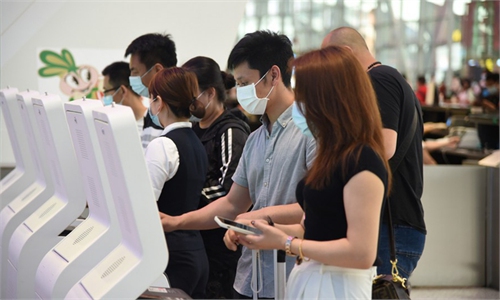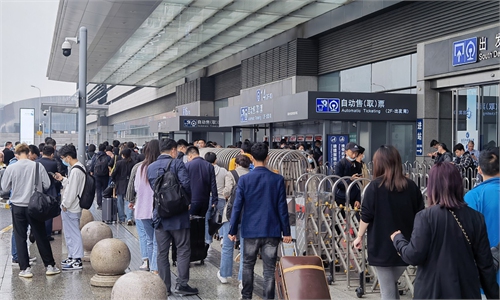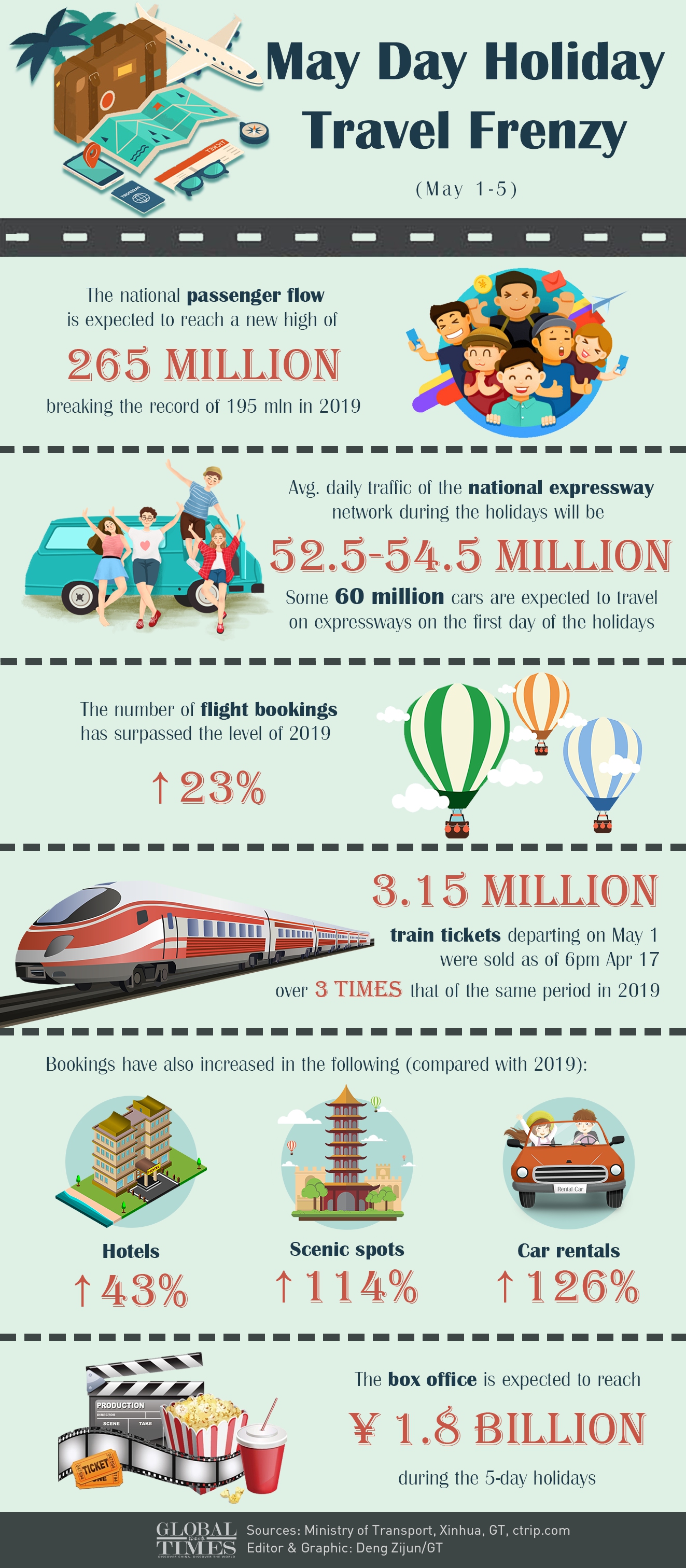
May Day Holiday Travel Frenzy Infographic: Deng Zijun/GT
Few things are more beautiful than taking a trip in the springtime, an experience that however has been complicated by the COVID-19 epidemic. For consumers in the world's second-largest economy, the coming five-day May Day holidays, which some say is the first long holiday they can really enjoy outdoor trip in the best season of the year since the virus hit last year, mark the start of an unprecedented consumption stimulus-themed month.
Travel-related spending is expected to see a huge rebound, with airline and train tickets for top destinations almost sold out and holiday hotspots fully booked. The catering industry, among the most-battered sectors amid the epidemic, also readies for a boost to pre-epidemic days as push for local cuisines and specialties is now gaining the spotlight, based on the Global Times' interviews with some food service providers in Yangzhou, East China's Jiangsu Province where a gourmet event began on Thursday, as part of a month-long national campaign to revitalize consumption.
The revenge consumption, however, doesn't go unchecked, with the country taking a more nuanced approach to balancing virus containment and wide-ranging moves to rev up consumption, experts said. A new law on preventing food waste went into effect Thursday, which is vital to ensure national food security.
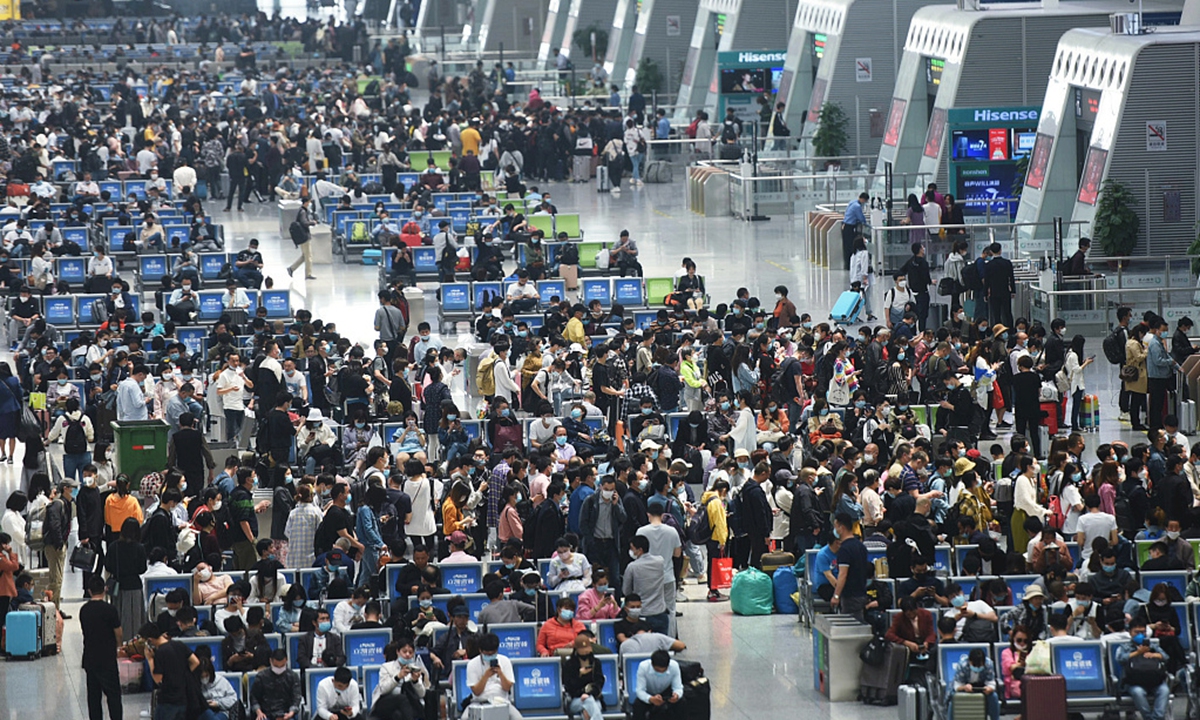
May Day Photo:VCG
Savor springtime
The May Day holidays expect 265 million passenger-trips. On Saturday, the first day of the five-day holidays, some 60 million vehicles are expected to travel on highways, the highest on record, Sun Wenjian, spokesman for the Ministry of Transport, said on Thursday.
Based on the holiday booking data from third-party platforms, about 70 percent of users opt to travel across provinces. Car rentals soared compared with 2019, up 126 percent, according to Sun.
During this year's May Day holidays, the country will continue to waive toll fees for passenger cars with less than seven seats.
The country witnessed 185 million passenger-trips during the May Day holidays in 2019, with 72.7 million on trains, official data shows.
The travel rush underlines a national push for consumption - widely known as one of the three bandwagons powering the Chinese economy - to return to pre-virus levels.
In the first quarter, retail sales grew 33.9 percent year-on-year, or a rise of 8.5 percent compared with the same period in 2019, official data showed.
Still, consumption recovery remains unbalanced, with some sectors, business models, categories and regions in a comparatively slow mode and the demand of the average shopper yet to be fully satisfied, Gao Feng, spokesperson for the Ministry of Commerce (MOFCOM), said at a press conference in Beijing earlier in April while announcing a slew of activities throughout May to add fuel to consumption.
As part of the multi-pronged campaign, a gourmet event began on Thursday near Dongguan street, a historical thoroughfare in the center of Yangzhou where restaurants specializing in Huaiyang cuisine, one of the four great traditions in Chinese cuisine, converge.
Chinese landmark food and dishes such as Yangzhou fried rice, and Shaxian snacks originating from East China's Fujian Province were showcased at the event, intended to provide a catalyst for the virus-hit catering sector.
Shaxian snacks are among Chinese local specialities that have been endorsed by Chinese President Xi Jinping. Xi has inspected Fujian several times, and his most recent visit was in March when he went to Yubang Village, Shaxian district in Sanming. Xi encouraged the industry of Shaxian snacks to further grow and contribute to the country's urbanization and rural revitalization.
On Monday, Xi visited a food-processing zone for luosifen rice noodles during his inspection of Liuzhou in South China's Guangxi Zhuang Autonomous Region.
Xi said that it's not an easy task to develop the small rice noodle business into such a large industry.
The country's catering industry revenues jumped 75.8 percent in the first quarter from the prior year, according to data from the National Bureau of Statistics. The quarterly reading still posted a 1 percent decline on average over the past two years.
"Diners might be seen crammed into the restaurant again during peak hours over the coming holiday, [something] that was quite common before the outbreak but has not often been seen over the past year, as people become wary about restaurant dining," Wan Haiyan, a manager of a local brand-name Huaiyang cuisine restaurant along Dongguan street, told the Global Times on Thursday.
Expecting a holiday-fueled revival for the restaurant that could fill up to roughly 200 customers, Wan said there's also an increasing trend toward admonishing diners against food waste.
Reasonable advice would be given to customers when they place orders, she added.
Chinese lawmakers on Thursday voted to adopt the anti-food waste law which came into force immediately. The law stipulates that customers could be charged a disposal fee if they leave excessive amounts of food, and those promoting food wastes will be fined.
"Our store weathered through the virus-battered past year, thanks to local tax reliefs and a three-month rent cut," Wang Ying, a graduate of Yangzhou University who started his own business selling ginger sweets along Dongguan street, told the Global Times on Thursday.
The upcoming holiday tends to be a boost for Wang's business, catapulting store sales to possibly tens of thousands of yuan per day, he said.
In Shanghai where a launch for consumption promotion month is scheduled for Saturday, simultaneously with the launch of its May 5 shopping festival--the local spinoff of the national campaign - the promotion scale and the number for brands' participation has surpassed last year, the Global Times learned from several businesses and department stores, who are expecting better second quarter sales compared with 2019.
During the second May 5 Shopping Festival in Shanghai, 12 business segments under e-commerce giant Alibaba will participate, with a higher enthusiasm and subsidy investment than that of last year, Dong Benhong, chief marketing officer of Alibaba group, told the Global Times in a statement.
Tencent will issue 1 billion yuan worth of digital coupons through the Wechat payment which can be consumed, covering 100 brands and 10,000 stores in Shanghai, the Global Times learned from the company.
The Super Brand Mall in Shanghai told the Global Times that it plans to offer discounts worth 1 million yuan and will sell first-line products of more than 20 well-known international brands, half of which are global top 500 companies with regional headquarters in Shanghai.
Starting Monday, retail giant Bailian Group will issue digital coupons worth 1.5 billion yuan, 25 percent more compared with 2020, which is expected to reach 300 million consumers, the group confirmed with the Global Times on Thursday.
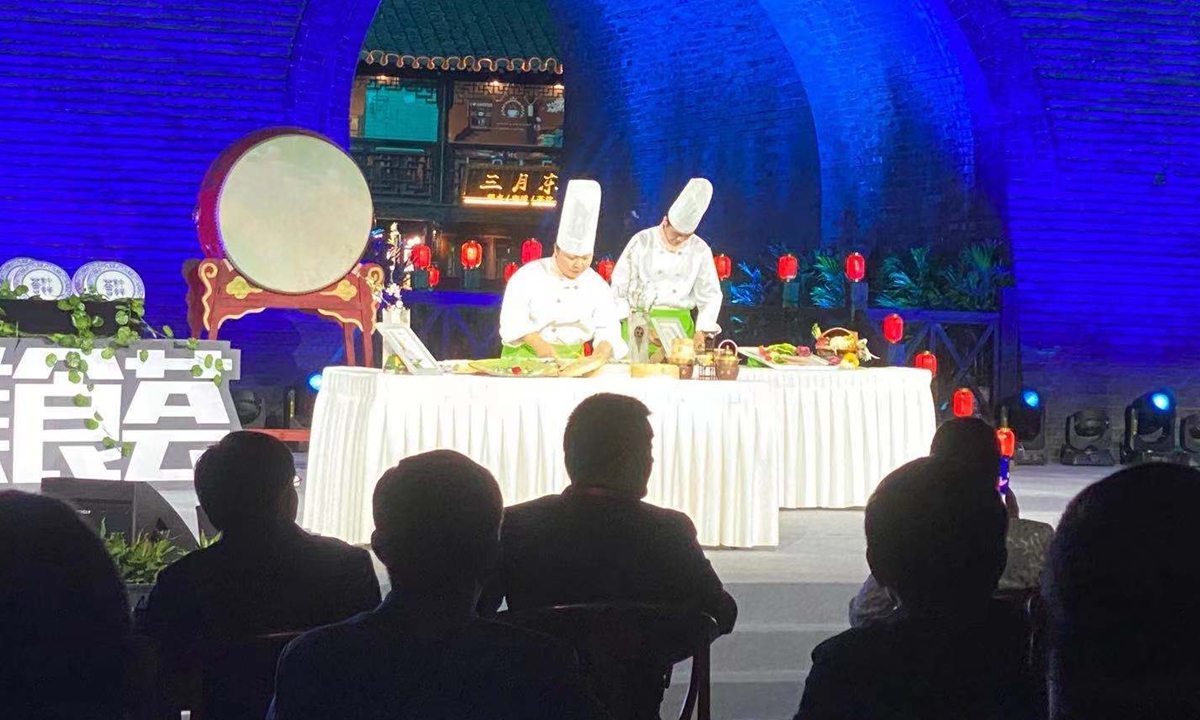
Chefs cook local cuisine at a gourmet event in Yangzhou, East China's Jiangsu Province on Thursday. Photo: Li Qiaoyi/GT
Balanced rebound
The multifaceted drive for consumption promotion is envisioned to reenergize the consumption bandwagon, experts said, noting it won't go unchecked amid the nation's regular epidemic containment measures.
Second quarter consumption in China will rebound to the 2019 level and even outperform it if there is no COVID-19 resurgence in China, Dong Dengxin, director of the Finance and Securities Institute at the Wuhan University of Science and Technology, told the Global Times on Thursday.
"Consumption will be a primary driver of growth this year, taking a larger proportion of GDP this year," Dong said, predicting that China's economic growth will rebound to 7 to 8 percent with a higher growth rate in the first half.
In addition to the holiday effect, the consumption potential will be unleashed throughout the year for China's diversified consumption patterns characterized by e-commerce and live-streaming, which will further stabilize the consumption growth in the year, Sun Lijian, director of the Financial Research Center at Fudan University in Shanghai, told the Global Times on Thursday.
"The development of the digital economy has improved the consumption capacity of the population in the third and fourth-tier cities. At the same time, Chinese enterprises are catching up with overseas enterprises, meaning that high income groups in coastal cities can now buy high quality domestic products at home, further boosting domestic demand," he said.
The uncertainty in the second half of the year lies in the recovery of employment in China as well as potential new COVID-19 outbreaks, observers said.
"The new wave of COVID-19 infections in India with a higher number of deaths is a test of China's epidemic prevention work. While boosting consumption in May, we should reduce the aggregation of large numbers of people to prevent the resurgence of COVID-19," according to Dong.
Urging attention to personal prevention and protection while traveling, especially for the elderly, during the May Day holidays, Wu Zunyou, chief epidemiologist of the Chinese Center for Disease Control and Prevention (CDC), on Thursday warned against the organization of and participation in large gatherings.
The country's virus containment is in good shape with no domestically transmitted cases, but it needs to be noted that the pandemic has become even more severe across the globe with some Asian countries seeing an abrupt rebound, Wu told reporters.
